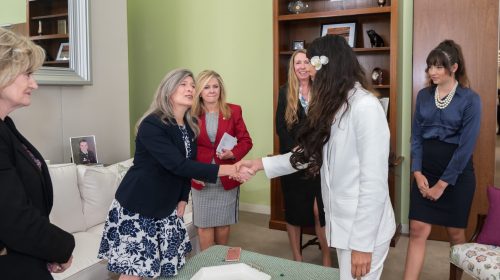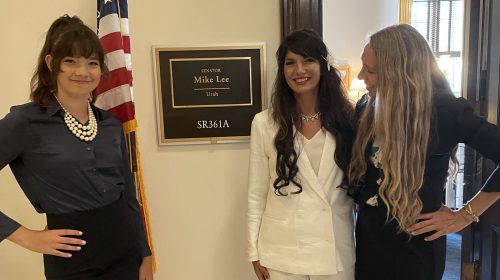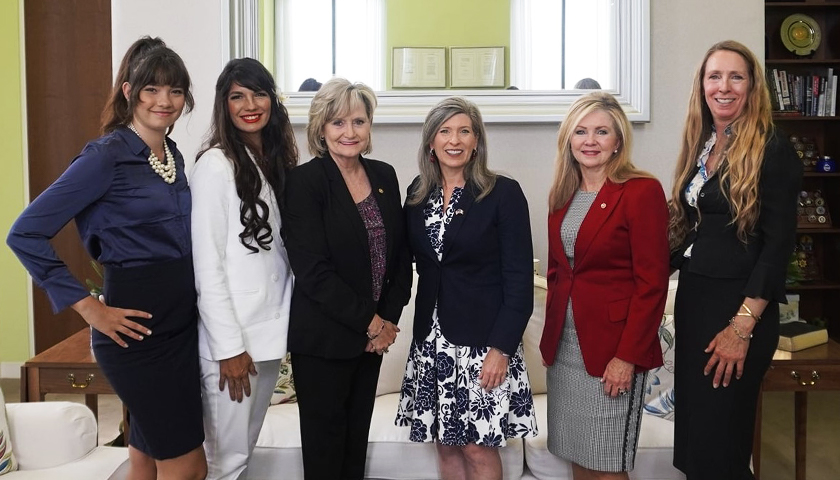by Mary Margaret Olohan
“We’re not often heard,” Cynthia Monteleone told a trio of female senators Thursday afternoon on Capitol Hill. “Though we are just three of thousands that this is happening to.”
Monteleone is a world champion track athlete who competed against a transgender competitor in the 2018 World Masters Athletics Championships in Málaga, Spain. Dressed in a white pantsuit with a fresh tropical flower tucked behind her ear, she spent Wednesday and Thursday urging Republican lawmakers to fight back against biological males competing in women’s sports.
Monteleone and her 16-year-old daughter Margaret, who raced and placed second behind a biological male as a high school freshman, told lawmakers Thursday that they are not asking for transgender students to be banned from sports.
 The two athletes instead suggested that transgender students have their own category to compete in, allowing female-bodied athletes to fairly compete only against other biological females.
The two athletes instead suggested that transgender students have their own category to compete in, allowing female-bodied athletes to fairly compete only against other biological females.
“Headlines say that Republicans want to ban transgender athletes from sports,” Cynthia Monteleone told the Daily Caller News Foundation as the mother and daughter recovered in their hotel room from a full day on Capitol Hill. “All the legislators yesterday and today have no interest in banning them, they want them to compete fairly. Just not at the expense of our daughters and granddaughters.”
Propelled by the Independent Women’s Forum, the Monteleone duo joined three-time Olympian Inga Thompson, a retired road bicycle racer, as they sat down with Republican Sens. Joni Ernst of Iowa, Cindy Hyde-Smith of Mississippi, and Marsha Blackburn of Tennessee early Thursday afternoon.
“When I first started, there were no sports for women,” Thompson said. “Just try to grasp that. It’s right up there with ‘we had no cell phones, no VCR’s.’ I remember being a young girl saying, ‘I want to do this, I want to do that.’”
“You can’t really grasp that, I think with this generation, the opportunities that the women before us have built,” she said.

“I’m just one of those women now standing on the shoulders of the women before me that brought in Title IX so that I had the opportunity to race,” Thompson added.
The three-time Olympian cyclist recalled fighting international officials on a policy that would have banned female athletes from competing when they were menstruating.
“I still remember these huge looming men looking down on me telling me this was the way it was going to be,” she said, adding comically that “not a single woman who has trained for 20 years of her life” would have said “Oh, I just started my period today, I just can’t start.”
“We really are in a situation again where the men are telling us what we can and cannot do,” agreed Cynthia Monteleone.
Lawmakers across the country have introduced and enacted bills prohibiting biological males from participating in women’s sports. A review by Axios found in April that Republicans had already introduced 61 bills in 2021 aimed at protecting women and children from unpopular gender policies.
Many of these bills have been fought by the American Civil Liberties Union. Others have been blocked by governors like Louisiana Gov. John Bel Edwards, who vetoed the state’s Fairness in Women’s Sports bill in June, calling it “a solution in search of a problem that simply does not exist in Louisiana.”
In late July, U.S. Circuit Judge Joseph R. Goodwin similarly ruled that a biologically male middle school student may compete on a girl’s cross country team in spite of West Virginia’s HB 3293.
Lawyers from the ACLU-West Virginia had argued that the law would unfairly prevent 11-year-old trans student Becky Pepper-Jackson from participating on a girls’ cross country team.
“We’ve said all along this cruel legislation would not survive a legal challenge, and we’re encouraged by the court’s decision today,” ACLU-WV Legal Director Loree Stark said in a statement following the ruling. “We hope trans kids throughout West Virginia who felt attacked and wronged by the passage of this legislation are feeling empowered by today’s news.”
“At this point, I have been provided with scant evidence that this law addresses any problem at all, let alone an important problem,” Goodwin wrote in his ruling. “When the government distinguishes between different groups of people, those distinctions must be supported by compelling reasons.”
The female athletes pushed back against such rhetoric, insisting that many discouraged young women simply drop out of sports rather than take a stand against transgender athletes.
“That’s a flat out lie,” Cynthia Monteleone said firmly of the suggestion that Fairness In Women’s Sport’s Acts are unnecessary in some states.
“It’s because we are being censored,” Thompson agreed. “A lot of the young girls just quietly walk away.”

The athletes encouraged lawmakers not to fixate on birth certificates when crafting transgender sports legislation: Monteleone instead asked legislators to focus on language about biological sex, pointing out that many states now allow birth certificates to be changed.
Thompson urged lawmakers to abandon clauses allowing exceptions for “extreme cases,” saying that activists use this language to create loopholes in the legislation.
Monteleone also noted that a couple states are only focusing on protecting high school sports, rather than college and professional sports.
The NCAA, rumored to have intimidated Republican South Dakota Gov. Kristi Noem from signing the state’s Fairness in Women’s Sports Act, warned in April that it would pull out of states that do not allow transgender students to participate in college sports.
“It’s really important to extend it and hold the NCAA accountable,” she said. “Because in their language, they say that they support women. And when they do this, they are not supporting women.”

The younger Monteleone described watching her teammates before their race against a biological male competitor, noting their anxiety and discouragement.
“When we were on the field about to run the race, all my teammates were just super discouraged,” Margaret Monteleone said. “We had all worked so hard, I practiced with them, I know how hard they worked. One was crying, they were all super anxious. Everybody was really nervous. It was really sad to see.”
The high school student told the DCNF that her friends and teachers have been very supportive — even those who are friends with the biologically male athlete who she competed against.
“I’m so lucky and proud of my daughter that she’s able to tell those of her generation, hey, no, actually the science says that even after hormone therapy and gender reassignment, that male bodied athletes still have an advantage over females,” her mother said. “Now the opposing side is saying, well, it shouldn’t be about science in this particular case, it should be about how we feel.”
“But feelings don’t play sports,” Cynthia Monteleone continued. “Bodies do. We female bodied athletes deserve our right to have those opportunities for scholarships and medals, to stand on the podium.”
The athletes said repeatedly that they are determined to help other women and girls speak up against biological males in women’s sports. They’ve gained a few haters and trolls, Cynthia Monteleone told the DCNF, but they don’t mind.
“True champions don’t place value in the opinions of others,” Monteleone said.
The world champion track athlete dwelt particularly on parting words from Sen. Hyde-Smith, who lagged behind her colleagues as they rushed out of the room to vote Thursday afternoon.
“You all keep speaking up,” Hyde-Smith told the athletes, adding repeatedly, “Shame on us if we allow this to happen.”
– – –
Mary Margaret Olohan is a reporter at Daily Caller News Foundation.
Photo by Sen. Cindy Hyde-Smith (via Facebook).




